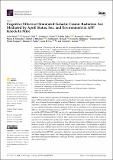Cognitive Effects of Simulated Galactic Cosmic Radiation Are Mediated by ApoE Status, Sex, and Environment in APP Knock-In Mice
Author(s)
Wieg, Laura; Ciola, Jason C.; Wasén, Caroline C.; Gaba, Fidelia; Colletti, Brianna R.; Schroeder, Maren K.; Hinshaw, Robert G.; Ekwudo, Millicent N.; Holtzman, David M.; Saito, Takashi; Sasaguri, Hiroki; Saido, Takaomi C.; Cox, Laura M.; Lemere, Cynthia A.; ... Show more Show less
Downloadijms-25-09379.pdf (8.725Mb)
Publisher with Creative Commons License
Publisher with Creative Commons License
Creative Commons Attribution
Terms of use
Metadata
Show full item recordAbstract
Cosmic radiation experienced during space travel may increase the risk of cognitive impairment. While simulated galactic cosmic radiation (GCRsim) has led to memory deficits in wildtype (WT) mice, it has not been investigated whether GCRsim in combination with genetic risk factors for Alzheimer’s disease (AD) worsens memory further in aging mice. Here, we investigated the central nervous system (CNS) effects of 0 Gy (sham) or 0.75 Gy five-ion GCRsim or 2 Gy gamma radiation (IRR) in 14-month-old female and male APP<sup>NL-F/NL-F</sup> knock-in (KI) mice bearing humanized ApoE3 or ApoE4 (APP;E3F and APP;E4F). As travel to a specialized facility was required for irradiation, both traveled sham-irradiated C57BL/6J WT and KI mice and non-traveled (NT) KI mice acted as controls for potential effects of travel. Mice underwent four behavioral tests at 20 months of age and were euthanized for pathological and biochemical analyses 1 month later. Fecal samples were collected pre- and post-irradiation at four different time points. GCRsim seemed to impair memory in male APP;E3F mice compared to their sham counterparts. Travel tended to improve cognition in male APP;E3F mice and lowered total Aβ in female and male APP;E3F mice compared to their non-traveled counterparts. Sham-irradiated male APP;E4F mice accumulated more fibrillar amyloid than their APP;E3F counterparts. Radiation exposure had only modest effects on behavior and brain changes, but travel-, sex-, and genotype-specific effects were seen. Irradiated mice had immediate and long-term differences in their gut bacterial composition that correlated to Alzheimer’s disease phenotypes.
Date issued
2024-08-29Department
Harvard University--MIT Division of Health Sciences and TechnologyJournal
International Journal of Molecular Sciences
Publisher
Multidisciplinary Digital Publishing Institute
Citation
Wieg, L.; Ciola, J.C.; Wasén, C.C.; Gaba, F.; Colletti, B.R.; Schroeder, M.K.; Hinshaw, R.G.; Ekwudo, M.N.; Holtzman, D.M.; Saito, T.; et al. Cognitive Effects of Simulated Galactic Cosmic Radiation Are Mediated by ApoE Status, Sex, and Environment in APP Knock-In Mice. Int. J. Mol. Sci. 2024, 25, 9379.
Version: Final published version